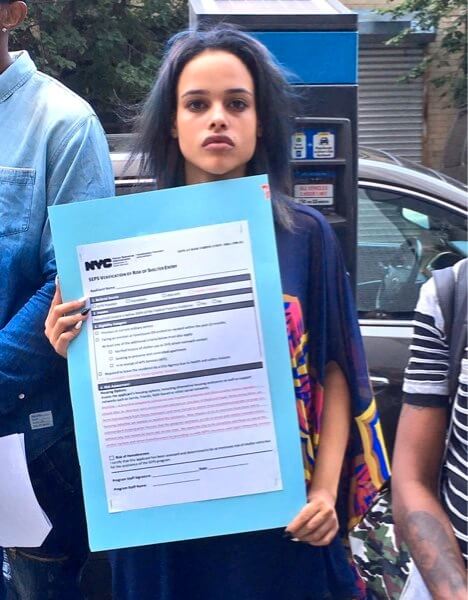By Naeisha Rose
Three-quarter tenants of Interline, an organization that provides substance abuse treatment and housing for addicts, rallied in Jamaica last week to fight the prospects of homelessness after the directors of the facility were charged with stealing over $2.3 million in a Medicaid kickback scheme, the state attorney general said.
Robert H. Corrado and Kristina Corrado, a father and daughter from Long Island, were arraigned in June for allegedly using Interline to force tenants in their below-market housing into attending substance abuse treatments only with their program, whether they were addicts or not, in order to receive Medicaid reimbursements, according to Eric Schneiderman’s office.
“We allege that the defendants engaged in a systematic, ongoing scheme to exploit those struggling with homelessness and substance abuse in order to line their own pockets,” Schneidermann said.
The rally was held Aug. 31 outside the city’s office of Human Resources Administration in Jamaica.
Denise Romero Gonzalez, a paralegal for Mobilization for Justice, a social justice organization representing disenfranchised people, said Interline is just one of three substance abuse providers to shut down for using housing schemes to steal money from Medicaid. The others are Narco Freedom and NRI Group, LLC.
Abandoned Interline tenants are still living in the buildings and waiting for housing vouchers from the city.
“Landlords will force people to go to a specific substance abuse program and the substance abuse program will refer any clients that they get who are in need of housing to a three-quarter house,” Gonzalez said. “It’s like a conveyer belt.”
According to Gonzalez, who is also a tenant organizer for the Three-Quarter House Tenant Organizing Project, a union fighting for fair and safe affordable housing, Interline’s housing located at 164-19 108th Ave. and two other places in Jamaica was substandard, restrictive and overcrowded.
“The conditions are deplorable,” Gonzalez said. “It’s a regular building that landlords will congest with four to six people on a bunk bed to a room.”
Housing meant to fit a family of four to six often had from 30 to 45 individuals living in them, according to Gonzalez.
“There were rigid curfews where clients were forced to leave in the daytime and also forced to have a curfew to get home before a certain time,” Gonzalez said. “If people didn’t go to a specific number of group sessions, they would not be allowed to visit their family on the weekend.”
Gonzalez and TOP are trying to get the city to provide Special Exit and Prevention Supplement vouchers to the victims of Interline in Queens and their four other facilities in Brooklyn help the tenants in securing permanent housing. Without the assistance, victims could end up in the shelter system.
Dozens of tenants sent letters to the city’s Social Services Commissioner Steve Banks to request SEPS in late July and are awaiting a response.
One of those tenants was Jasmine Monk, 19, who battles drug addiction and depression. She came to Interline seeking a second chance at life.
“When I started my program at Interline, I was promised assistance in finding housing, job and school placement, among other things,” Monk said. “However, none of this ever came true.”
During her four months at Interline’s housing, she lived amid horrible conditions.
“In the houses, we faced terrible health conditions, including rodent and insect infestation, exposure to chemicals, leaks, not to mention overcrowding of the houses with many of us sharing small rooms,” Monk said. “Despite the conditions and house rules we were forced to follow, for many of us, these three-quarter houses were better than the shelter system or no housing at all,.
Monk is disappointed in Interline and hopes she can receive a SEPS voucher.
“I am in the process of going back to college and finding a job to support myself. I need a place to call my home so I can do those things. Like others here, I need this so I can move forward,” Monk said.
(fixing error – TOP stands for Three-Quarter House Tenant Organizing Project)
Reach reporter Naeisha Rose by e-mail at nrose

































